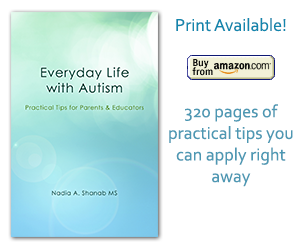The Three Major Goals: Independence, Communication, Socialization
Nadia Shanab | autism, general advice, parenting, tips28 May 2015

Parents and educators, there are many goals you wish you could achieve all at once, as you raise or educate a child with autism. This is a forceful positive attitude! I am not asking you to abandon your dreams and wishes. All I am saying is, prioritize your dreams and wishes. Most importantly, know that achieving one goal will lead to achieving the following one.
For all individuals on the autism spectrum, independence, communication, and socialization are the most crucial qualities they need to acquire at the youngest possible age. Look at the bigger picture and imagine your child graduating high school and facing the adulthood life whether, in college or in a job. The biggest asset you want to give your child is to help her become independent, able to communicate with the outside world, while having a social life, while away from you.
The Chinese proverb goes something like: “Don’t give your child a fish, but teach him how to catch a fish.” Same concept applies, in particular, to kids with autism. I have dedicated an entire chapter in my book to “Teach Independence”, Chapter 26, page 193.
Most parents, without even thinking, tend to do things for their children with autism. Their excuse would be “She is still too young.”, “It is faster if I did it.”, “I’m not ready for a temper tantrum right now.” And the list of pretexts goes on. What you believe to be a short cut for you both, will actually lead you to a needless troublesome lengthy path as your child grows older. Let your child fly with her own wings.
Now that your child became more independent, using the transportation system, able to order food, able to go grocery shopping, prepare some meals, care for her self hygiene, capable of holding down a job,…what’s next? Usually, individuals with autism live in their own world. They are introvert, don’t approach people, and talk very little. People are generally good-natured and willing to help and communicate. But communication is a reciprocal two-way mechanism. Therefore, your child should be trained to approach people in an appropriate way and be able to express herself to others. That too should start early on, because it takes time and effort to develop good communication skills. In my book Chapter 6 Communication page 39 offers many tools to foster and encourage communication skills.
Furthermore, most individuals with ASD have poor social skills, no matter how high-functioning they are. More than anybody else, individuals with autism need to be part of a community and need to belong to a bigger entity. Why? Fitting in a society will facilitate their life by making them easily accepted and understood. And when they ask for help, people will be prepared and familiar with how to communicate with them. In your absence, the community will be a huge support your child can count on. The neighbors of your child is another prime asset she will rely on when she starts living on her own. Socialization happens through all the communication skills you’ve helped her to acquire. In Chapter 7, page 206, you will learn the tools to “Boost Social Skills“.
I understand that you want your child/student to be improving at all levels at the same time; academically, socially, emotionally, physically and behavior wise. It is not impossible to see progress at different levels at once, but the nature of any progress in general is gradual and single-sided. What does that mean? Be patient and achieve one success at a time, then move on to the next goal.
Tips
- It is okay if your child’s handwriting is not that great while she is able to do her shoelaces. You see the difference? Handwriting will develop over the years, but it is less acceptable to tie the shoelaces of a an eight or nine years old. Prioritize!
- Using the magic words: “Please!” and “Thank you!”, being polite, and having good table manners are more important than reciting a poem. I am not against learning poems by heart, let her do it, but being socially accepted is crucial to fit in society. Prioritize!
- Don’t compare your child’s progress with others’. There are no two kids with ASD alike. Each learning and developing journey is different.
- Keep stretching your child’s skills as she grows and develops. Keep trying and introducing new concepts.
- Don’t underestimate your child’s intelligence.
Never lose focus on your target. Independence, communication, and socialization should always remain your focal point. Once the child shows improvement in theses three areas, modify and re-prioritize your goals. Know your child’s needs and strengths simultaneously. Building on your child’s strengths, will help you handle her challenges.
Acquiring these three skills first will pave a safe course for her to pursue. They will help her explore and open the doors and horizons for a bright future.
Children with autism are teachable and trainable!
nadia shanab
Tags: asperger's syndrome, autism, communication, discipline, early intervention, independence, organization, parenting, social interaction, tips
